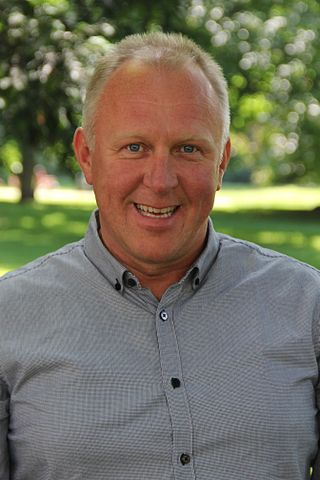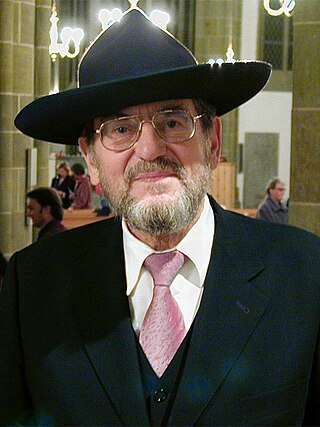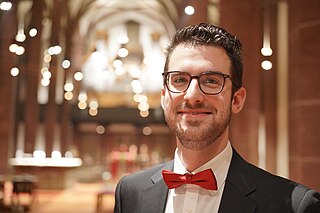Related Research Articles
"Vom Himmel hoch, o Engel, kommt", also known as "Susani", is a German Christmas carol. It was first printed in 1622 as an alternate text to an older melody. In eight stanzas of two lines each, the angels are requested to come from Heaven, bring their musical instruments, and play and sing of Jesus and Mary, and ultimately for peace for the people.

Gotteslob is the title of the hymnbook authorized by the Catholic dioceses in Germany, Austria, South Tyrol, Luxembourg and Liège, Belgium. First published in Advent 2013, it is the current official hymnal for German-speaking Catholics, succeeding the first common German hymnal, the 1975 edition of the same name. Each diocese published a book containing a common section and a regional section. The first editions amounted to around 4 million copies.

Helmut Alfons Schlegel is a German Franciscan, Catholic priest, meditation instructor, author, librettist and songwriter. He is known for writing new spiritual songs, set to music by various composers.

Neues Geistliches Lied, abbreviated NGL, is a music genre of songs in German intended for church usage, and based on contemporary lyrics and with music by contemporary composers.
Winfried Heurich is a German organist and composer.

Patrick Dehm is a German Catholic theologian, supervisor and clinical Gestalt therapist. He and his brother founded the Eugen Dehm foundation, supporting a holistic health concept, in memory of their father.

Oskar Gottlieb Blarr is a German composer, organist, church musician and academic teacher.
Joachim Raabe is a German church musician and a composer of sacred music, especially of the genre Neues Geistliches Lied.
TAKT is a group of writers and composers of new songs for use in Christian churches, initiated in 1947. The genre which the members promoted was later called Neues Geistliches Lied. The name is short for TextAutor/innen- und Komponist/innen-Tagung, a name that the group adopted in 1997.
"Einer ist unser Leben" is a poem in five stanzas, written by Lothar Zenetti in 1973. It became a Christian hymn of the genre Neues Geistliches Lied (NGL) with a 1971 melody by Jean Liesse. The song is part of many hymnals, both Catholic and Protestant, and of songbooks, remaining popular in the 21st century.
"Wo Menschen sich vergessen" is a Christian hymn in German, with text written in 1989 by Thomas Laubach and with music by Christoph Lehmann. The hymn of the genre Neues Geistliches Lied (NGL) is also known by the beginning of the refrain, "Da berühren sich Himmel und Erde". It appears in regional sections of the 2013 hymnal Gotteslob, and in other songbooks.
"Manchmal feiern wir mitten im Tag" is a Christian hymn written in 1974 with German text by Alois Albrecht and a melody by Peter Janssens. The song, of the genre Neues Geistliches Lied (NGL), is part of German hymnals, including Gotteslob, and songbooks including ecumenical collections and books for young people. It begins: "Manchmal feiern wir mitten im Tag ein Fest der Auferstehung".

Johannes M. Schröder is a German organist, composer and Catholic church musician. After several years responsible for the church music at the Westerwälder Dom, he moved to St. Bonifatius, Wiesbaden. He is also a lecturer and a music editor.
Habakuk is a German pop band from Frankfurt, formed in 1975. The group is focused on new Christian music of the genre Neues Geistliches Lied.
"Wo ein Mensch Vertrauen gibt" is a Christian hymn with text by Hans-Jürgen Netz, written in 1974, with a melody by Winfried Heurich and Fritz Baltruweit. The song of the genre Neues Geistliches Lied was included in hymnals and songbooks.
"Segne, Vater, diese Gaben" is a Christian hymn. The authors of text and melody are unknown. It is meant to be sung as a round. The song, which is often used for a prayer before a meal, has appeared in German hymnals and songbooks. It is regarded as a song of the genre Neues Geistliches Lied (NGL), and has been used in schools and events for young people.
"Ich lobe meinen Gott, der aus der Tiefe mich holt" is a 1979 Christian hymn with words in German by Hans-Jürgen Netz and a melody by Christoph Lehmann. This Neues Geistliches Lied song has appeared in the German Protestant and Catholic hymnals. It is a preferred song for conventions such as Kirchentag.
"Auf dem Weg durch diese Nacht" is a Christian hymn created in 2005 by lyricist Eugen Eckert and composer Horst Christill. The song of the genre Neues Geistliches Lied (NGL), was first published and recorded in 2006, and has appeared in German hymnals and songbooks. Auf dem Weg durch diese Nacht became the title of a 2021 choral collection of new compositions for Abendlob.
"Ich lobe meinen Gott von ganzem Herzen" is a Christian hymn in German, with a first stanza by Gitta Leuschner, written in 1980, and two more stanzas that Günter Balders added in 2002. The text is based on Psalm 9. The original song came from France and was a rather close paraphrase of the psalm, to a melody composed by Claude Fraysse in 1976. The song of the genre Neues Geistliches Lied (NGL) has appeared in the German Protestant and Catholic hymnals and songbooks, especially collections for children.
References
- ↑ "Christoph Lehmann". RUNDEL Verlag (in German). Retrieved 3 June 2021.
- 1 2 "Lieder von Christoph Lehmann (*1947)". Evangeliums.net (in German). Retrieved 3 June 2021.
- 1 2 3 "Komponistenportrait Christoph Lehmann". Erzbistum Köln (in German). Retrieved 3 June 2021.
- ↑ "Dolcimelo, Christoph Lehmann". Il Dolcimelo Home (in German). Retrieved 3 June 2021.
- ↑ "Christoph Lehmann / Artistes / AEOLUS". aeolus-music.com (in German). Retrieved 3 June 2021.
- ↑ "Neues "Gotteslob" 2013: Autoren aus dem Erzbistum Köln" (PDF). Diocese of Cologne (in German). Retrieved 8 June 2021.
- ↑ Veen, Johan van. "Christoph Schaffrath (1709 - 1763) / Six Sonatas". Diocese of Cologne (in German). Retrieved 8 June 2021.